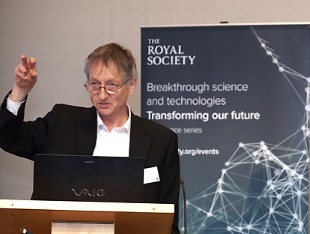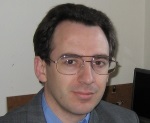Links to external sources may no longer work as intended. The content may not represent the latest thinking in this area or the Society’s current position on the topic.
Machine learning - Breakthrough science and technologies: Transforming our future conference series

Watch the presentations.
Read the conference report (PDF).
On 22 May 2015, the Royal Society launched a new series of unique, high-level conferences to address the major scientific and technical challenges of the next decade. Breakthrough Science and Technologies: Transforming our Future conferences will feature cutting-edge science from industry and academia and bring together leading experts from the wider scientific community, industry, government, funding bodies and charities.
The first conference was on the topic of machine learning and was organised by Dr Hermann Hauser KBE FREng FRS and Dr Robert Ghanea-Hercock. We were delighted to host a high profile line-up of speakers including a keynote from Professor Geoff Hinton FRS (University of Toronto/Google), and over 150 delegates from across industry, academia, government and the media.
Machine learning now underpins most global economic activity, from search query engines, to big data filtering, through to biotechnology and robotics. The breadth of its applications, including image recognition, speech translation, big data analytics, robotics and healthcare, was clearly outlined by the speakers during the day. Alongside the current state-of-the-art in software, we also heard about future hardware developments in high performance silicon processors, and machine learning as a “killer app” for quantum computing.

Our panel discussion focused on the longer term social and economic impacts. With over one billion diagnostic tests performed each year in the NHS, Sir Malcolm Grant considered the role of machine learning in analysing the huge datasets produced. Professor Nick Bostrom described the implications of developing “superintelligent” machines, including the benefits but also the existential risk doing so may pose. Professor Nick Jennings argued that in the future humans and machines would need to learn how to better interact and collaborate in order to fully exploit machine learning’s potential.
Overall, the conference showcased machine learning as an emerging technology making rapid progress in a number of industries and applications. Connections between different sectors, such as those formed between delegates during the day, will be a key part of this process.
Videos of the talks will be uploaded on this website in the next month. A report, summarising the key messages from the meeting, will be published later this year.
The conference and speakers were featured in a number of press articles including:
- Google a step closer to developing machines with human-like intelligence, The Guardian
- AI and the future for humanity, FT.com
- It's time we turned social networks into real communities, The New Scientist
- Self-adapting robots, Artificial Intelligence in medicine, Ageing healthily, BBC Radio 4 Inside Science
- Artificial intelligence will enhance and personalise NHS care, says chairman of NHS England, The Daily Telegraph
- AI could help solve humanity’s biggest issues by taking over from scientists, says DeepMind CEO, Computing.co.uk
- Document search engines will be able to think and reason like people, argues AI expert, Computing.co.uk
About the conference series
Each conference will focus on one topic and will seek to cover key issues, including:
- The current state of the key industry sectors involved
- The position of the UK and how it can benefit from the technology
- The future direction of research
- The challenges faced in turning research into commercial success
- The skills base needed to deliver major scientific advances
- The wider social and economic impacts
The conferences will bring together leading experts from across different sectors, who will reflect state-of-the art knowledge from both industry and academic centres of excellence, including major international companies. Discussion will be captured in a conference report that will be used to influence policy and decision makers.
The next conference in the series will be Robotics and Autonomous Systems: Visions, Actions and Challenges and will be held at the Royal Society on Friday 13 November 2015.
These conferences are a key component of the Society’s five-year Science, Industry and Translation initiative which demonstrates our commitment to reintegrate science and industry at the Society and to promote science and its value by connecting academia, industry and government.
Enquiries: industry@royalsociety.org


